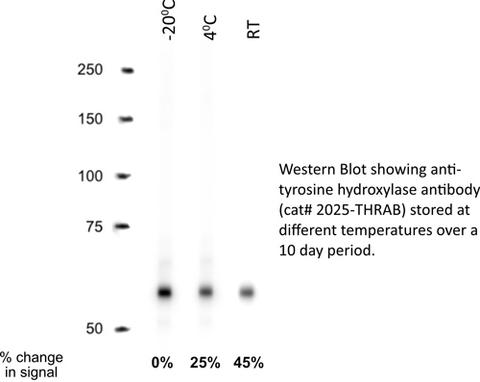The Ins and Outs of Antibody Stability
What Makes Antibodies Unstable?
Antibody molecules are prone to instability during storage whether at room temperature or even at -200 C. Oxidation and proteolytic degradation of proteins are significant concerns for antibody stability even at 40 C and the frequency of these reactions significantly increases at higher temperatures. Another concern for antibody stability is created when antibodies undergo freeze/thaw cycles. When a stock vial of antibody is stored at -200 C or -700 C it must undergo freeze/thaw cycles in order to be used in experiments. Freeze/thaw cycles can denature antibodies, causing them to aggregate and lose their overall binding capacity. Freeze/thaw cycles may also cause ice crystal formation which leads to antibody shearing and further degradation.

Dilution into working solutions should only be done right before your experiment.
Another set of issues leading to antibody instability relates to antibodies in diluted working solutions that are used in IHC, WB or other applications. Two critical issues arise in these antibody preparations. The first is that the stability of antibodies, like all proteins, is reduced as dilution is increased due to shearing. Bovine serum albumin is added to many purified antibody solutions to protect the antibody from dilution effects. The second issue relates to microbe growth and contamination in the working solution, which is much more problematic after transfer from -200C storage to refrigerator storage at 40C and even more so at room temperature. For this reason it is recommended that working solutions are not prepared until just before use. When this is not possible, the inclusion of antimicrobial agents in all working solution dilutions of the stock antibody is highly recommended.
How Does Glycerol Help Stabilize Antibodies?
Antibodies are often formulated in a buffer containing 50% glycerol. Glycerol has been widely recognized for its ability to stabilize antibodies at -200 C as it causes the native protein ensemble to shift to more compact states.1Glycerol also prevents protein aggregation by inhibiting protein unfolding and by stabilizing aggregation-prone intermediates.1However, recent evidence has emerged showing that glycerol, unlike ethylene glycol, also stabilizes proteins at room temperature.2 The presence of 50% glycerol obviates concerns about freeze/thawing effects on antibodies stored at -200 C as it prevents freezing of the antibody solution. This enables aliquots to be taken directly from a vial at -200 C without ever needing to be thawed. Glycerol additionally protects antibodies from shearing by preventing ice crystal formation.
- Mechanisms of protein Stabilization and Prevention of Protein Aggregation by Glycerol Vagenede V., Yap,M. and Trout,B. Biochemistry 2009, 48, 46, 11084–11096
- Cryo vs Thermo: Duality of Ethylene Glycol on the Stability of Proteins Naidu,F. Rao,D and Prabhu,N. Phys. Chem. B 2020, 124, 45, 10077–10088